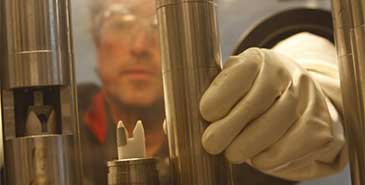Press release issued:
12 March 2014
The University of Bristol and the UK’s National Nuclear Laboratory have signed a statement of intent to work more closely to explore opportunities in joint research, R&D and training, which will provide support to industry aligned with the Government’s Nuclear Industrial Strategy.
The National Nuclear Laboratory (NNL) is a Government-owned company undertaking applied nuclear R&D. One of its key roles is to support Government and industry in strategic nuclear programmes and a major part of its mission is to work closely with academia in nuclear research and training.
The University and NNL have a strong history of collaboration and have previously worked together to study corrosion and ageing effects on materials relating to nuclear energy in the UK, such as uranium, graphite and steels.
Both organisations believe that broader and closer collaboration in the future will be beneficial in a number of areas, including current nuclear generation and plant life extension, new build, waste management and decommissioning and next generation civil nuclear power plant.
Dr Tom Scott, Director of the University’s Interface Analysis Centre, said: “The University is delighted to be formalising and expanding its relationship with the National Nuclear Laboratory through the Nuclear Research Centre. Closer integration of our research to more effectively support the safe delivery of the UK civil nuclear programme will be of great national benefit.”
Professor Graham Fairhall, NNL Chief Science and Technology Officer, added: “NNL and the University of Bristol have both committed to growing their existing relationship. The intent is to provide internationally leading research and teaching, which will help to underpin the safety of current and future UK nuclear operations, including the new build programme, beginning with the proposed Hinkley Point C power station in Somerset. This will mark a significant expansion of nuclear research and teaching activities in the south west of the UK.”
The Nuclear Research Centre (NRC), formed by the University in partnership with Oxford University in 2011, aims to strengthen nuclear energy related research and teaching in the region to support the delivery of the Government’s strategy on low-carbon, secure energy.
Recently the University has been re-establishing its existing relationships with a number of strategic industrial partners, and this includes the recent signing of a ‘Statement of Intent’ with NNL to support the growing need for a physical research hub in the South West.
Further information
The Bristol Nuclear Group (BNG) is overseen by a steering committee:
Professor David Smith, Mechanical Engineering
Dr Tom Scott, Interface Analysis Centre (IAC) Director
Professor Peter Flewitt, Visiting Professor in Physics
Dr John May, Civil Engineering
The support team is led by Jean Vogel, with Jamie Townes and Anona Williams.
As part of the joint nuclear activity the BNG has mutually agreed upon nine research themes, each representing areas in which Bristol is considered to have specific and leading expertise:
- Structural integrity – Professor David Smith, Mechanical Engineering
- Structural engineering- Professor Colin Taylor, Civil Engineering
- Nuclear Materials and modelling – Professor Peter Flewitt, School of Physics and Professor Neil Allan, School of Chemistry
- Waste and Fuel management – Dr Tom Scott, IAC Director
- Software Reliability – Dr John May, Civil engineering
- Nuclear hazards and risks – Dr David Richards, School of Geographical Sciences
- Monitoring technologies and systems integration – Professor Paul Wilcox, Mechanical Engineering and Dr Jaap Velthuis, School of Physics
- Development of new materials – Professors Hua-Xin Peng and Fabrizio Scarpa, Advanced Centre for Composites in Innovation and Science (ACCIS), also Bristol Centre for Nanoscience and Quantum Information (NSQI)
- Robotics – Dr Walterio Mayol-Cuevas, Deputy Director of Bristol Robotics Laboratory (BRL)
About the National Nuclear Laboratory (NNL)
- The UK’s National Nuclear Laboratory (NNL) is a company owned by the UK Government. It operates as a commercial business and currently receives no direct grant funding from Government.
- NNL has over 10,000 person-years of nuclear industry experience across the whole nuclear fuel cycle.
- NNL provides the experts and technologies to ensure the UK nuclear industry operates safely and cost effectively today and for the future. The company has also provided support and services to the UK and other Governments and to the European Union.
- NNL has facilities at Sellafield and Workington in Cumbria, Preston in Lancashire, Risley in Cheshire, Stonehouse in Gloucestershire and Harwell in Oxfordshire.
About the Nuclear Research Centre (NRC)
The Nuclear Research Centre is part of the University of Bristol’s Cabot Institute. The institute carries out fundamental and responsive research on risks and uncertainties in a changing environment. Its interests include natural hazards, food and energy security, resilience and governance, and human impacts on the environment. Its research fuses rigorous statistical and numerical modelling with a deep understanding of interconnected social, environmental and engineered systems – past, present and future. It seeks to engage wider society – listening to, exploring with, and challenging our stakeholders to develop a shared response to twenty-first century challenges.
About the Cabot Institute
The Cabot Institute carries out fundamental and responsive research on risks and uncertainties in a changing environment. It drives new research in the interconnected areas of climate change, natural hazards, water and food security, low carbon energy, and future cities. Its research fuses rigorous statistical and numerical modelling with a deep understanding of social, environmental and engineered systems – past, present and future. It seeks to engage wider society by listening to, exploring with, and challenging its stakeholders to develop a shared response to 21st Century challenges.
